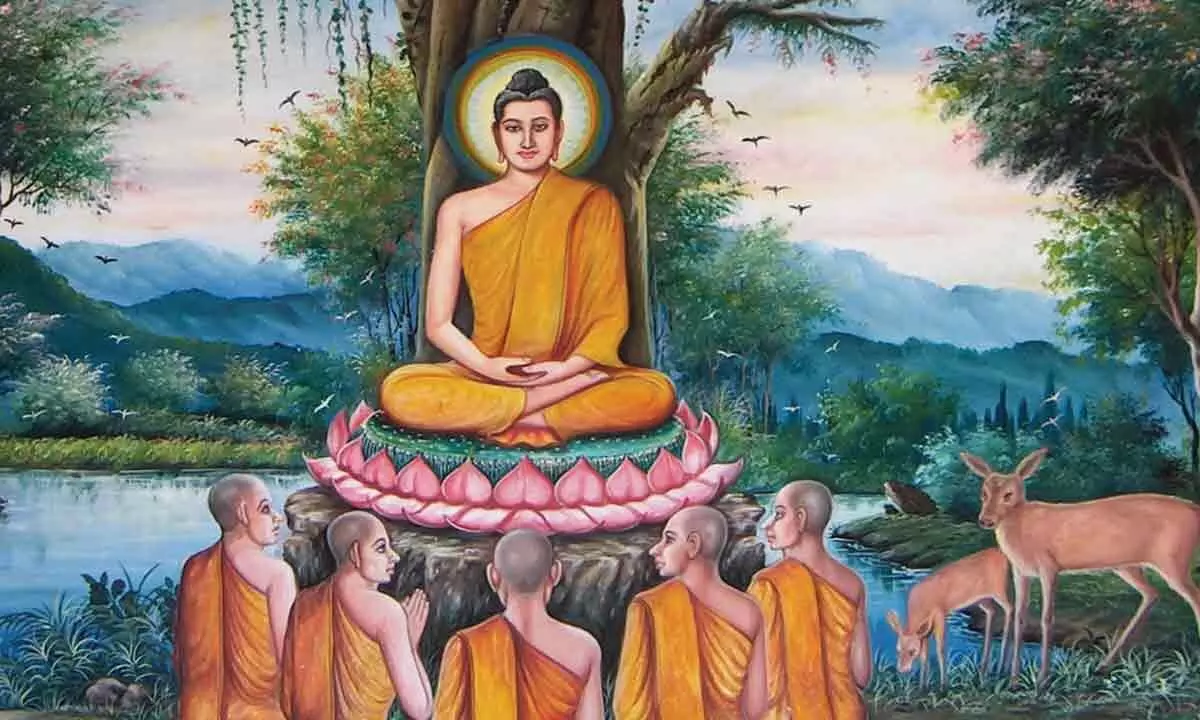Live
- BJP got over Rs 2,600 cr donations in 2023-24
- Maharashtra Guv worships Lord Balaji
- CM Naidu to take part in pension distribution in Palnadu dist
- Strict vigilance to prevent pilfering of PDS rice
- Sanjha Utsav helps to empower self-help groups: MEPMA director
- 7 days of national mourning declared; state funeral for Dr. Manmohan Singh
- Chandrababu Mourns the Death of Former PM Dr. Manmohan Singh
- ‘RSS magazine’ contradicts Bhagwat on Sambhal dispute
- Human-made calamity in Delhi
- Harvesting Hope In Deserts
Just In

The rise of the great civilisations of the world witnessed the development of literature, art and sophisticated philosophical systems from the Greeks to the Indian system.
The rise of the great civilisations of the world witnessed the development of literature, art and sophisticated philosophical systems from the Greeks to the Indian system.
One of the great teachers of all times is the Buddha Shakyamuni who was born as prince Siddhartha in the kingdom of Magadha (now India) and taught the 8,4000 teachings to unravel the mind's true nature to help alleviate the suffering of the sentient beings through the rigorous practice of learning, reflection, and meditation.
Contemporary to Buddhism, other Indian schools of thought like Vaishesika, Nyaya, Samkhya, Yoga, Purva Mimansa, Vedanta, Carvaka, Jainism, etc. flourished making the Indian sub-continent a great centre for learning for subjects like Philosophy, Mathematics, Cosmology, Astrology, Metaphysics, Logic, Art, Poetry, etc.
In Dhammapada, Buddha says: "The Mind is the chief and precedes all phenomena." And further the Buddhist philosopher Vasubandu (4th -5th century C.E.) of erstwhile Nalanda University who was a great light at the peak of India's resplendent Gupta empire, in his text Abhidharmakosakarika said: "The diversity of the world arose from karmas, which in turn is, the intention and its actions. Intention is the mental karma; what gives rise to by (the intention) are physical and verbal." Further exploring the mind-brain paradox, the great Indian Buddhist logician Acharya Dharmakirti (7th Cent C.E.) in pramanavarttika (Commentary on Valid Cognition) Chapter 2 (pramanasiddhi) which is a commentary on Acharya Dignaga's words of salutation to the Buddha in Pramanasamuccaya has given valid logical reasoning to establish that the mind and the body are two distinct entities.
One of the questions that His Holiness the 14th Dalai Lama Tenzin Gyatso, a Noble Peace Prize Laureate 1989, is frequently asked during his Public Talks around the world is, "What is the purpose of our life?" To which he simply answers "To be happy."
Through the platform of Mind and Life Dialogues between the Buddhist scholars and the experts in the disciplines such as Neuroscience, Quantum Physics, Psychology, etc., unprecedented research is being done in the field of consciousness studies and Mapping of Emotions.
The rich legacy of the Buddha's teaching spread far and wide and has stood the tests of all eras assimilating different cultural contexts without losing its essence; more so becomes most relevant in the 21st century when modern scientific and technological advancement has posed serious ethical questions before us.
Today as we are faced with challenges like climate crisis, war and terrorism, pandemic, gender disparity, communal disharmony, etc., this great perennial wealth of wisdom can be an eye opener to the world. The pertinent question being: how can this wealth can be delivered to the world?

© 2024 Hyderabad Media House Limited/The Hans India. All rights reserved. Powered by hocalwire.com







